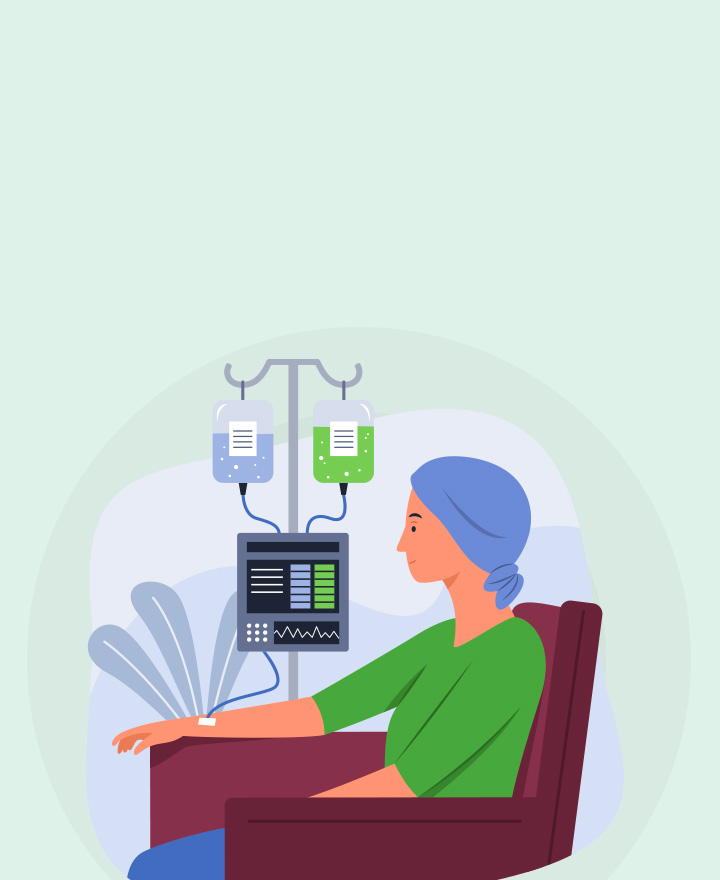

All About Chemotherapy
Imagine an internal battle where tiny and persistent cells become enemies, posing a threat to the body. This enemy is cancer. To help fight these cancer cells, advanced medicine introduces a strong tool called chemotherapy. This is a widely used treatment that involves the use of drugs to target and destroy these harmful cells. Let’s look into the basics of what is chemotherapy and explore its key aspects.
What Is Chemotherapy
Informally referred to as ‘chemo’, this is a medical treatment that uses drugs to treat various types of cancer. These drugs are designed to target and destroy rapidly dividing cancer cells.
Your doctor may refer to chemotherapy as standard chemotherapy, traditional chemotherapy, or cytotoxic chemotherapy.
What factors determine a chemotherapy plan?
Understanding about chemotherapy is vital as it involves using various drugs to help destroy cancer cells. A doctor who specializes in treating cancer with medication and the one who will prescribe your chemotherapy is called a medical oncologist. You may receive a combination of drugs, because this sometimes works better than 1 drug by itself.
The drugs, dose, and treatment schedule depend on many factors. These include:
1. Type of cancer
2. The cancer's stage, considering tumour size, location, and spread
3. Your age and general health
4. Your bodyweight
5. Potential drug side effects: Excessive side effects can lead to treatment plan changes
6. Presence of other medical conditions
7. Previous cancer treatments
Chemotherapy Administration
Chemotherapy can be administered systemically in various ways:
• Through an intravenous (IV) infusion, commonly used and received by most individuals
• Via injection, typically given as a shot
• Orally, in the form of a pill or liquid for swallowing
• Topically, in the form of a cream applied by rubbing onto the skin
How does chemotherapy treat cancer?
• Chemotherapy moves around the body through your blood and can reach cancer cells anywhere, which is called systemic treatment.
• Chemotherapy targets cells that are dividing into two new cells.
• Our body has many cells; after we grow up, most don’t divide much. They only divide when they need to fix something.
• When cells divide, they split into two identical new cells. This keeps happening, making more cells. But in cancer, cells keep dividing and make a lump called a tumour.
• As cancer cells divide more than normal cells, chemotherapy can eliminate them better.
• Some drugs damage the part of the cell that makes it divide, while others stop the chemical process that helps cells divide.
Side Effects of Chemotherapy
Common side effects of chemotherapy drugs include:
• Anaemia
• Bleeding
• Constipation
• Diarrhoea
• Fatigue
• Hair loss
• Infection
• Loss of appetite
• Nausea and vomiting
• Pain & numbness
How frequently do you undergo chemo sessions?
The frequency of each session can range from many hours to a couple of days, contingent upon the drug or drug mix. Your sessions might be scheduled weekly or with intervals of 2, 3, or 4 weeks. The frequency is also determined by the specific drugs used and your overall chemotherapy plan. When chemotherapy is administered through an infusion pump, the drugs might be delivered:
• Consistently over a few months (continuous administration)
• Over a few days during each month
• Across a span of a few weeks
Conclusion
Understanding what is chemotherapy is crucial for individuals diagnosed with cancer and their caregivers. Chemotherapy is a multidimensional approach that depends on various factors like cancer type, stage, and a patient’s health. By targeting rapidly dividing cells and hindering their growth, chemotherapy plays a pivotal role in treating cancer. Regular monitoring, combination therapy, and managing side effects are integral to this treatment. As medical advancements continue, the landscape of chemotherapy is evolving to provide better outcomes and improved quality of life for cancer patients.
One of the important components of our overall wellness is also being financially secured. Healthcare emergencies can happen any time, but a good health insurance policy can protect you from such uncertain situations. To know more about Wellness and other health related tips, visit the Wellness Corner
Source: my.clevelandclinic, cancer.net, nhsinform.scot, cancerresearchuk
Disclaimer: This blog provides general information and discussions about health and related subjects. The information and other content provided in this blog, website or in any linked materials are not intended and should not be considered, or used as a substitute for, medical advice, diagnosis or treatment. Kindly contact your Doctor before starting a new medicine or health regime.
Related Articles
What are the Side Effects of Chemotherapy
How to Prepare for Chemotherapy
Alternative Cancer Treatments: 11 Options To Consider
Health Insurance Cover for Chemotherapy
Know about Health insurance, Critical illness and Cancer insurance plan
Published on September 25, 2023


 Car Insurance
Car Insurance  Bike/Two Wheeler Insurance
Bike/Two Wheeler Insurance  Health Insurance
Health Insurance  Pet Insurance
Pet Insurance
 Travel Insurance
Travel Insurance  Home Insurance
Home Insurance  Cyber Insurance
Cyber Insurance  Third Party Vehicle Ins.
Third Party Vehicle Ins.  Tractor Insurance
Tractor Insurance  Goods Carrying Vehicle Ins.
Goods Carrying Vehicle Ins.  Passenger Carrying Vehicle Ins.
Passenger Carrying Vehicle Ins.  Compulsory Personal Accident Insurance
Compulsory Personal Accident Insurance  Travel Insurance
Travel Insurance  Rural
Rural  Critical illness Insurance
Critical illness Insurance